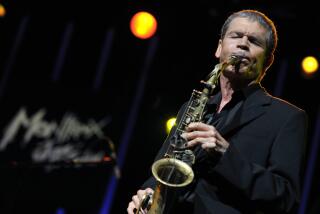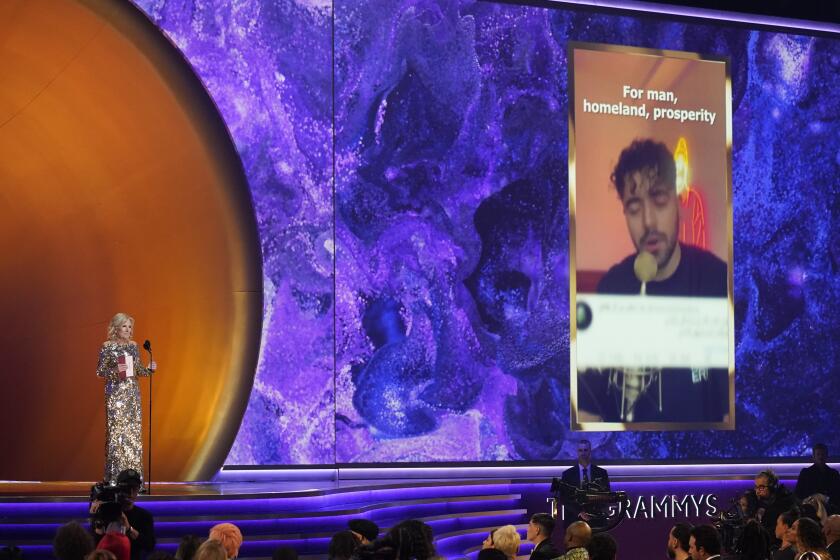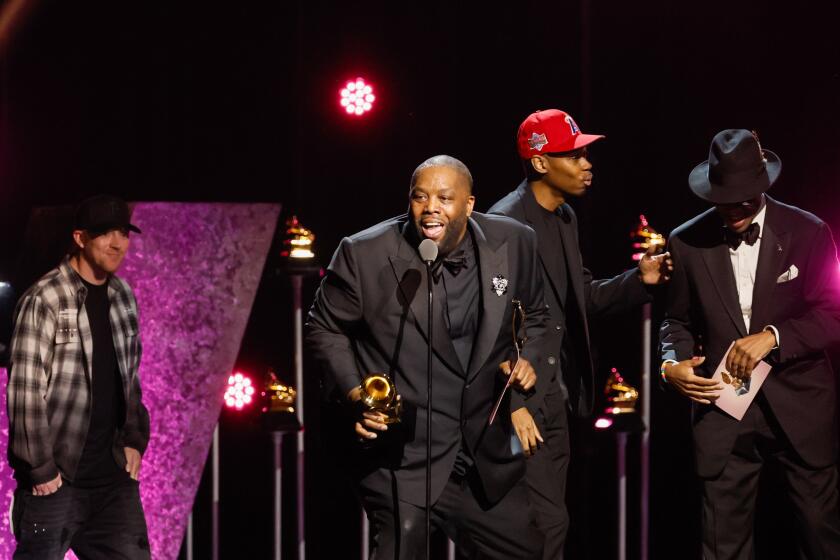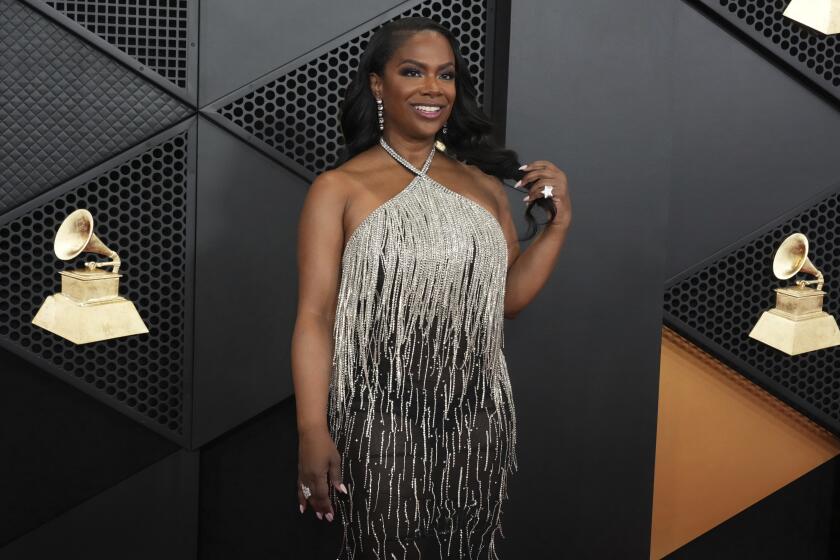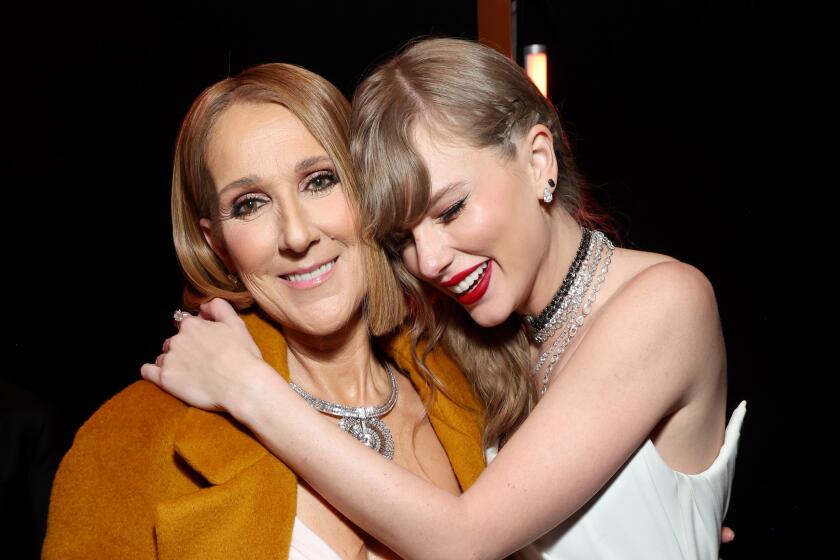Maybe Her Time
Karrin Allyson revealed no signs of Grammy anticipation as she strode on stage last week at Catalina Bar & Grill. Wearing a filmy lace blouse over black pants, she simply joined her musicians and immediately dug into a hard-grooving vocal interpretation of Benny Golson’s jazz classic “Whisper Not.”
She was appearing at the Hollywood venue in a booking conveniently scheduled to bring her into town to attend today’s Grammy Awards. For the first time in a career that has seen the release of seven albums over the past decade, Allyson has received a nomination--for “Ballads,” a tribute to the late John Coltrane--in the jazz vocal album category.
For the record:
12:00 a.m. March 3, 2002 FOR THE RECORD
Los Angeles Times Sunday March 3, 2002 Home Edition Main News Part A Page 2 A2 Desk 1 inches; 28 words Type of Material: Correction
Radio host--In a Wednesday Calendar story about singer Karrin Allyson, Bill McGlaughlin was incorrectly identified as an NPR commentator. He is host of the public radio program “Saint Paul Sunday.”
Bearing a striking resemblance to Michelle Pfeiffer’s nightclub singer in “The Fabulous Baker Boys”--a similarly unlikely blend of blond, Middle American wholesomeness and cool sensuality--she elected not to mention the nomination onstage, choosing to allow her singing to stand on its own without external certification.
Asked later how she was handling her feelings about the nomination, Allyson shrugged and smiled broadly. “I know everyone says it’s an honor just to be [nominated],” she said, “but it’s the truth. I mean, look at the group I’m in--Shirley Horn, Mose Allison, Kurt Elling, Dianne Reeves--wow! I really am happy just to be there. I’m guessing that it’s probably going to go to Mose or to Shirley. They’re the veterans, and they deserve it.”
Still, for a singer who has been gutting out a career since the late ‘80s--earning every step along the way--something more than a nomination would be a very nice achievement, indeed. But, she insists, if one of the “veterans” prevails, there’s always next year. And if one thing is clear about how Allyson has handled her progress as an artist, it’s that her undeniable musical skills are fully matched by her inner toughness and determination.
Her gig at Catalina’s, for example, was typical of how she is obliged to handle her bookings. Although concert performances typically generate enough revenue to allow her to bring her regular players--her “guys,” as she calls them--the more limited budgets for club dates generally mean that she must perform with local musicians, supplementing the group with one or two of her key players. In this case, her longtime guitarist Danny Embrey worked with a quartet of L.A. musicians: bassist Tom Warrington, drummer Joe LaBarbera, pianist Bill Cunliffe and saxophonist Bob Shepherd.
“It can be difficult,” said Allyson. “We had a quick rehearsal at the start of the week, which in this case was easier, since I’ve worked with Joe and Tom before, and they’re hip to our approach. But I’m always adding new material, and that can be a challenge, too, which is why it’s such a luxury to have Danny with me.
“I’m not a girl singer just stuck in a band. I have a lot of different kinds of things I like to do--Brazilian stuff, French songs, bebop, ballads, and the guitar has become very important in my repertoire.”
That diversity was on display throughout her set. Her affection for Brazilian music surfaced with “O Barquinho (My Little Boat)” and “Te Amo”; there were a few tunes from the Grammy-nominated “Ballads”--especially a simmering reading of “Say It Over” and a wordless vocalization of “Naima”; and a tribute to Mose Allison, via his “Everybody’s Crying Mercy.” The sweetly lyrical quality of Allyson’s voice adapted with surprising ease to the darker aspects of her ballads. And her improvising--sometimes in scat style, sometimes via instantly invented adaptations of lyrics--was the product of a knowledgeable musical perspective.
“I love space in my music,” she said. “And I get annoyed with singers who are so in love with the sound of their own voice that they never shut up to listen to what’s happening around them. I mean, this is chamber music, and we’re having a musical conversation up there on stage, which means there has to be space for everyone to participate. To do that, there has to be complete agreement on what we’re playing, and how we’re playing it.”
The required compatibility becomes especially evident about halfway through Allyson’s set at Catalina’s, when she moves to the keyboard to join the other players. With a bachelor’s degree in classical piano, she possesses ample technical skills.
But what is more apparent is the manner in which she backs up her talk about having space in the music. Laying down modest, unobtrusive chording, tossing in an occasional reflective riff, she blends the piano perfectly with her vocals, allowing the lyric line to breathe while, at the same time, enhancing and supporting the story that the song is telling.
“I take it as a real compliment when people say I come from a musician’s point of view,” Allyson said. “But I’ve also had to do a lot, all my life, that didn’t directly have anything to do with the music. Like when you start out, and you have to market yourself. Musicians hate to do that. But I’ve done so willingly and wholeheartedly.”
And what she continues to have to do, since Allyson notes that she is currently without a manager.
“I could have used a really good manager a few years ago, and I still don’t have one,” she said with a resigned sigh. “But there are reasons for that, the primary one being that I haven’t met anyone who does it better than I do. I know they’re out there; I just haven’t met them yet. And I’m super cautious since I’ve had some bad experiences along the way.”
Allyson’s refusal to remain stuck in the sort of unfortunate professional situations that have handicapped the careers of many singers is the product of a self-reliance dating back to her earliest years as a performer. Born in Great Bend, Kan., the thirtysomething Allyson studied classical piano at the University of Nebraska, but she quickly realized it wasn’t a track she intended to pursue as a lifetime occupation.
“I was pretty good,” she recalled, “but I’m a very social person, and it just involved too much time alone.”
When she discovered Nancy Wilson via a classic pairing with Cannonball Adderley on a single tune--”Sleeping Bee”--Allyson saw a new territory beckoning.
“First, I put together a little jazz combo,” she said, “then I started to date a horn player. After that, I was in a rock ‘n’ roll band, I was in a Hawaiian band, and I was doing a lot of solo vocals accompanying myself on piano. I did a lot of nights that way--in gay bars, restaurants, cocktail lounges, you name it.”
She then moved to Kansas City, outside the major media mainstream. But, with its rich jazz history, the city had a powerful impact on her music. It was there that she self-produced the first of her seven albums, “I Didn’t Know About You.” (It was also self-released, though it is now available on Concord, where she continues to record.) At the time the first album was issued, Down Beat magazine described it as “a portrait of an artist as a young woman with subtlety running hot in her veins.”
Two years ago, New York beckoned, and Allyson now lives on the Upper West Side with her companion, NPR commentator Bill McGlaughlin. She has persistently chosen to explore her various musical interests, despite the music business tendency to prefer that artists function within easily identifiable categories. The album before “Ballads,” for example, was “From Paris to Rio,” in which she applied her own inimitable style to a collection of French and Brazilian songs.
“Sometimes it feels to me as though, ‘OK, I’m going here, and now I’m going there, and now I’m going somewhere else,’” she said. “But at the same time, I don’t like to do the same kind of songs all the time, and, thankfully, I get a lot of feedback from people saying that they like to hear different things.”
Even here, however, the practicality that has driven her career from the very beginning surfaced in her comments.
“I always try to keep focused on what matters,” she said, “which is the music. But I also have to remember that the people I’m playing for and the people I’m playing with--my audience and my musicians--are important too.
“After all,” Allyson said, “I’m an entertainer. I’m not in this for stardom. I’d like a certain amount of respect, and I’d like to work less hard for more money. But if an audience doesn’t like what I’m doing, I’m probably not going to get much of a chance to be heard. And the best thing about this Grammy nomination is that it tells me that I’m being heard.”
More to Read
The biggest entertainment stories
Get our big stories about Hollywood, film, television, music, arts, culture and more right in your inbox as soon as they publish.
You may occasionally receive promotional content from the Los Angeles Times.


